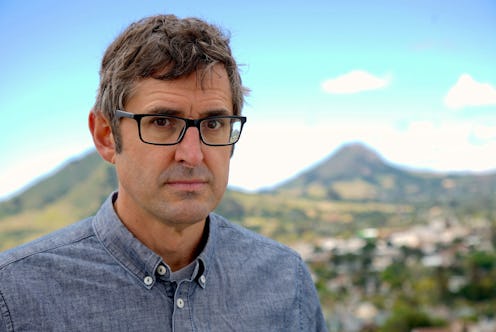Entertainment
Louis Theroux's New Documentary Series Is Just As Contentious As You'd Imagine

Get those T-shirts laundered, Louis Theroux devotees (you know which ones I mean): the documentarian is returning with a brand new series, and it sounds just as compelling as you'd expect. Theroux investigates adoption, polyamory, and assisted dying across the United States in the series, titled Altered States. He told the BBC the show "was an attempt to take a look at the most intimate and most difficult sides of life (birth, love and death) in an American context, and specifically ways in which these issues are being handled differently." So what do we know about Louis Theroux's new documentary series — and perhaps more importantly, when will we get to see it?
The series begins on Sunday, November 4, the BBC says, airing at 9 p.m. on BBC Two. According to the Independent, Altered States comprises three episodes, each tackling a characteristically thorny topic. In "Take My Baby," Theroux will look into the wildly profitable industry of private adoption, which sees prospective adoptive parents paying dizzying sums to be matched with a pregnant person. "Maximum Love" is set in Portland, Oregon; Theroux will examine whether traditional monogamy is outmoded by meeting with families who practice polyamory, or ethical non-monogamy. In "Choosing Death," meanwhile, the journalist will investigate the U.S. states where assisted dying is legal for the terminally ill, seeking to understand the motivations of those who choose to end their lives with medical intervention.
Theroux told the BBC that his production team is typically drawn to "knotty issues, issues where there is angst, where there is high emotion, where there are wrenching decisions to be made." What attracts him to the difficult topics he covers? Surprisingly, given Theroux's much-lauded career, he's frequently motivated by doubt. "If anything, it’s in a spirit of self-doubt and anxiety that I tend to take on difficult subjects," he told the broadcaster. "In other words, my biggest fear as a programme maker is the idea of either being boring, or presuming on the goodwill of the audience that they’ll want to see whatever I do. That runs completely counter to how I see myself, which is as a journalist and a curious person, but not as an entertainer who is interesting in his own right."
According to the documentary maker, making Altered States had a profound impact on his own opinions of his subjects. "It’s almost always the case that when you go into covering a story, you have some preconceived ideas. You have an opinion on subjects — whether it’s something like assisted dying or polyamory," he said. "Sometimes it is surprising the ways in which either making a connection with someone, or an argument someone makes in the room, or just being around a subject for weeks slightly tweaks your experience and your understanding of it."
In particular, his stance on assisted dying was challenged in the course of making the series. "In the assisted dying film there are groups that educate people on 'end-of-life options' and telling people how to make devices which will end their life," Theroux explained. "I went into it in the spirit of 'people should be allowed to do what they want — it’s your life, do what you want with it' — within the law. And then, it was in the act of telling the story that I became more sensitised to the problems with it. So I do go on a journey with the stories."
Theroux doesn't just want to inspire his viewers to buy more T-shirts with his face on it; instead, he hopes to "challenge their own preconceptions," he told the BBC. "Hopefully they will appreciate what’s involved in these very difficult decisions and maybe open their minds to different ways of doing things," he said. "In meeting people who appear to be good people, people who are sensitive and thoughtful and kind but who are doing things in a different, possibly counter-intuitive way, you can go on a journey with that person and open up new perspectives."